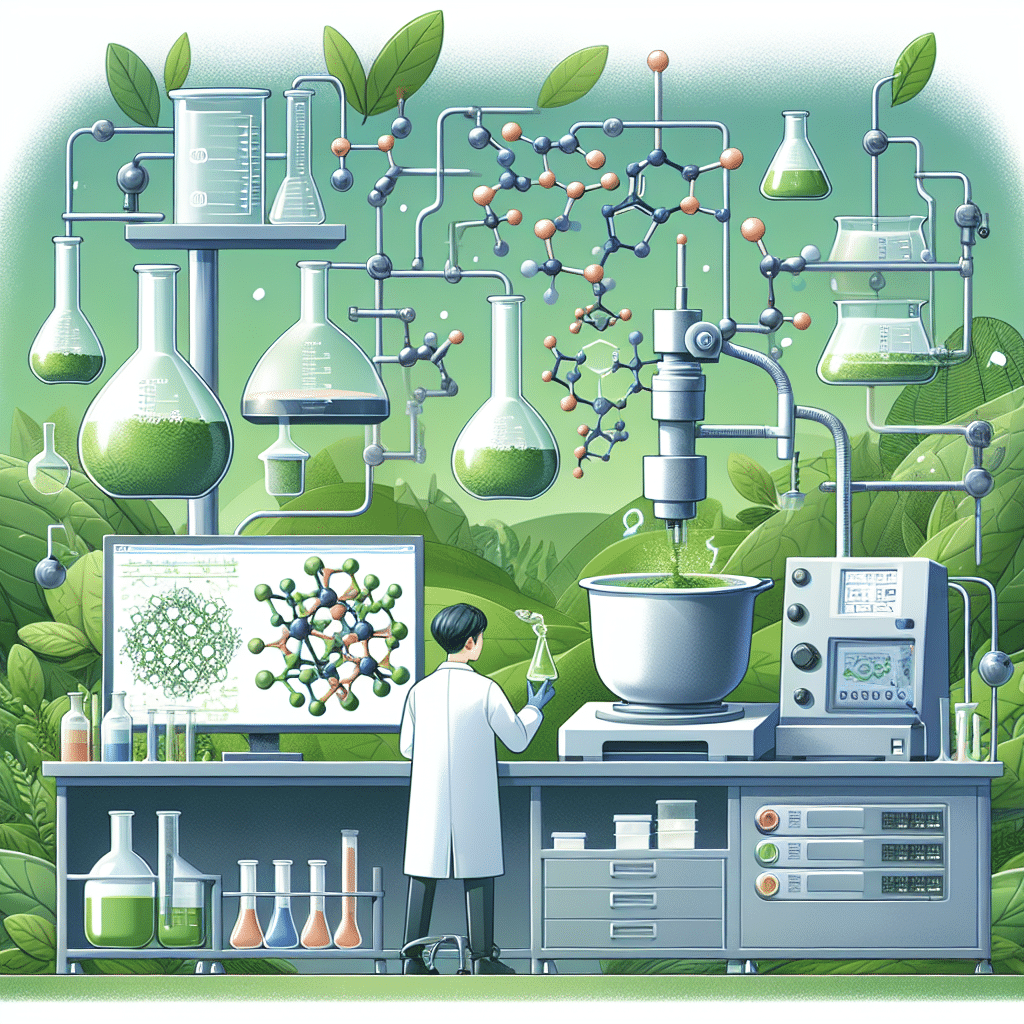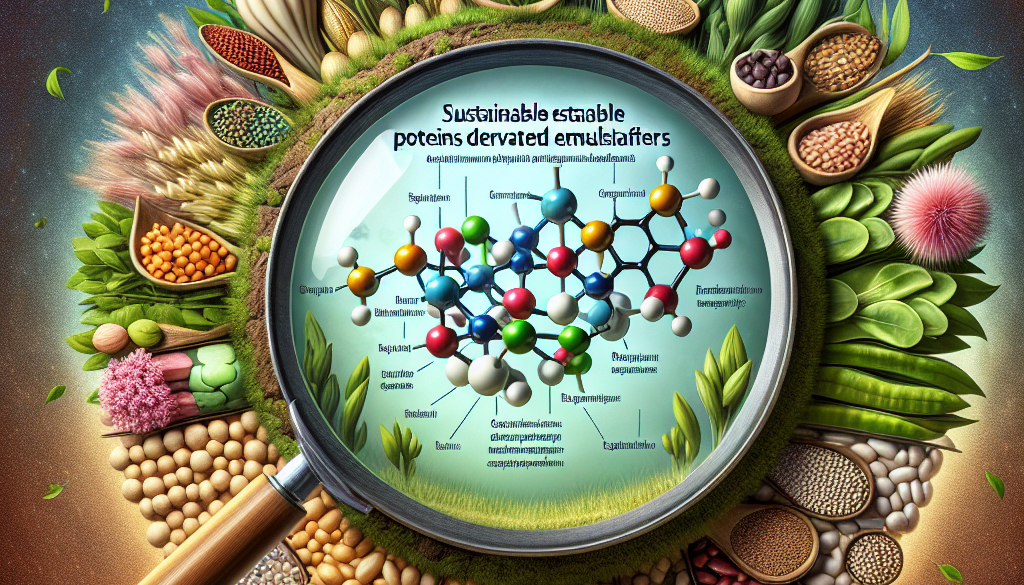Emulsifiers Derived from Sustainable Proteins: Eco-Friendly Choices
-
Table of Contents
- Emulsifiers Derived from Sustainable Proteins: Pioneering Eco-Friendly Choices
- The Role of Emulsifiers in Food Production
- Why Sustainable Proteins?
- Benefits of Emulsifiers from Sustainable Proteins
- Examples of Sustainable Protein Emulsifiers
- Case Studies and Statistics
- Challenges and Future Directions
- Conclusion: Embracing Sustainable Protein Emulsifiers
- Discover ETprotein’s Sustainable Protein Products
Emulsifiers Derived from Sustainable Proteins: Pioneering Eco-Friendly Choices

As the world becomes increasingly aware of the environmental impact of industrial processes and consumer products, the demand for sustainable alternatives has never been higher. In the realm of food science and manufacturing, one area that has seen significant innovation is the development of emulsifiers derived from sustainable proteins. These eco-friendly choices are not only better for the planet but also offer a range of benefits for manufacturers and consumers alike.
The Role of Emulsifiers in Food Production
Emulsifiers are substances that help to stabilize mixtures that would otherwise separate, such as oil and water. They are essential in creating a variety of food products, from ice cream and mayonnaise to bread and chocolate. Traditional emulsifiers often come from sources like eggs, soy, or synthetic compounds, which can have environmental and health implications.
Why Sustainable Proteins?
Sustainable proteins are derived from sources that do not deplete natural resources or cause significant harm to the environment. These proteins can come from plants, algae, or even lab-grown cultures. By using sustainable proteins as emulsifiers, manufacturers can reduce their carbon footprint, conserve water, and minimize land use.
Benefits of Emulsifiers from Sustainable Proteins
- Eco-Friendly Production: Sustainable protein sources often require less water and land than traditional crops and livestock, reducing the environmental impact.
- Health Advantages: Many sustainable proteins are hypoallergenic and free from cholesterol, making them a healthier option for consumers.
- Versatility: Sustainable protein emulsifiers can be tailored to suit a wide range of food products, offering flexibility in food design and formulation.
Examples of Sustainable Protein Emulsifiers
Several innovative sources of sustainable proteins have been explored for use as emulsifiers:
- Pea Protein: Pea protein is a highly sustainable option that has gained popularity due to its low environmental impact and excellent emulsifying properties.
- Algal Protein: Algae can be cultivated with minimal land use and can produce proteins that function effectively as emulsifiers.
- Insect Protein: Insects are a highly efficient protein source and their derived emulsifiers are being explored for their potential in food production.
Case Studies and Statistics
Several companies and research institutions have conducted studies demonstrating the effectiveness and benefits of sustainable protein emulsifiers:
- A study by a European university found that pea protein emulsifiers performed comparably to traditional egg-based emulsifiers in mayonnaise, with a significantly lower environmental footprint.
- Algal protein emulsifiers have been shown to improve the texture and shelf-life of vegan ice cream, according to research published in a leading food science journal.
- Statistics from the Food and Agriculture Organization indicate that switching to plant-based protein emulsifiers could reduce water usage in food production by up to 50%.
Challenges and Future Directions
While the benefits of sustainable protein emulsifiers are clear, there are challenges to their widespread adoption:
- Consumer Acceptance: Educating consumers about the benefits of sustainable proteins is essential for market acceptance.
- Regulatory Hurdles: Ensuring that new emulsifiers meet food safety standards can be a lengthy process.
- Scaling Production: Developing efficient methods to produce sustainable protein emulsifiers at scale is crucial for their economic viability.
Despite these challenges, the future looks bright for sustainable protein emulsifiers. Ongoing research and development are likely to lead to more efficient production methods and even broader applications in the food industry.
Conclusion: Embracing Sustainable Protein Emulsifiers
The shift towards sustainable protein emulsifiers represents a significant step forward in the quest for eco-friendly food production. By choosing these innovative ingredients, manufacturers can reduce their environmental impact while offering consumers healthier and more sustainable products. As technology advances and consumer awareness grows, we can expect to see a continued rise in the use of sustainable protein emulsifiers in a variety of food products.
Discover ETprotein’s Sustainable Protein Products
If you’re looking to incorporate sustainable protein emulsifiers into your food products, ETprotein offers a range of high-quality options. Their portfolio includes organic rice protein, clear rice protein, pea protein, clear pea protein, and other plant-based proteins that are non-GMO and allergen-free. ETprotein’s commitment to sustainability and quality makes them an excellent choice for businesses seeking to make eco-friendly choices without compromising on performance.
About ETprotein:
ETprotein, a reputable protein Chinese factory manufacturer and supplier, is renowned for producing, stocking, exporting, and delivering the highest quality organic bulk vegan protein and plant proteins. They include Organic rice protein, clear rice protein, pea protein, clear pea protein, pumpkin seed protein, sunflower seed protein, mung bean protein, peanut protein etc. Their offerings, characterized by a neutral taste, non-GMO, allergen-free attributes, cater to a diverse range of industries. They serve nutraceutical, pharmaceutical, cosmeceutical, veterinary, as well as food and beverage finished product distributors, traders, and manufacturers across Europe, USA, Canada, Australia, Thailand, Japan, Korea, Brazil, and Chile, among others.
ETprotein specialization includes exporting and delivering tailor-made protein powder and finished nutritional supplements. Their extensive product range covers sectors like Food and Beverage, Sports Nutrition, Weight Management, Dietary Supplements, Health and Wellness Products, and Infant Formula, ensuring comprehensive solutions to meet all your protein needs.
As a trusted company by leading global food and beverage brands and Fortune 500 companies, ETprotein reinforces China’s reputation in the global arena. For more information or to sample their products, please contact them and email sales(at)ETprotein.com today.














